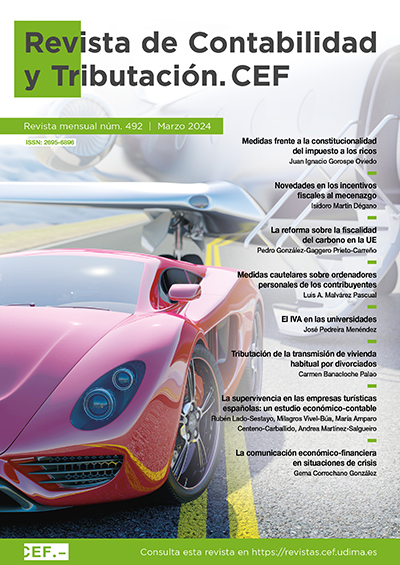La reforma de la fiscalidad sobre el carbono como elemento central del liderazgo de la Unión Europea contra el cambio climático
DOI:
https://doi.org/10.51302/rcyt.2024.18959Palabras clave:
precios de carbono, reforma del mercado de derechos de emisión, MAFC, emisiones del transporte marítimo, fiscalidad medioambientalResumen
En el marco del paquete Fit for 55, la Unión Europea (UE) ha decidido reformar sustancialmente su política de «precios de carbono», el principal instrumento del que dispone para alcanzar sus objetivos de descarbonización. Los elementos de esta política son puramente fiscales, como la reforma de la Directiva 2003/96/CE, de fiscalidad de la energía y los productos energéticos, o bien de naturaleza equivalente a la fiscal, como es el caso de la reforma del mercado europeo de derechos de emisión o la introducción del nuevo Mecanismo de Ajuste Fiscal de Carbono en Frontera.
El resultado de la aplicación conjunta de las nuevas medidas será el de añadir unos muy importantes sobrecostes por carbono a las actividades económicas que se desarrollan en la Unión, lo que contribuirá a que se produzca una transformación de la actividad industrial y el transporte en la UE de un ritmo e intensidad desconocidos hasta ahora. Para los profesionales y estudiosos de la materia fiscal, no es posible desconocer que las medidas tributarias y de naturaleza equivalente que adopte la UE van a jugar en este contexto un papel más determinante del que hayan tenido nunca en los procesos de transformación de la economía vividos en el viejo continente.
Descargas
Citas
Babiker, M. H. y Rutherford T. F. (2005). The Economic Effects of Border Measures in Subglobal Climate Agreements. The Energy Journal, 26(4), 99-125.
Beaufils, T., Ward, H., Jakob, M. y Wenz, L. (2023). Assessing Different European Carbon Border Adjustment Mechanism Implementations and their Impact on Trade Partners.
Farid, M., Keen, M., Papaioannou, M., Parry, I., Pattillo, C. Ter-Martirosyan, A. y otros (2016). After Paris: Fiscal, Macroeconomic, and Financial Implications of Climate Change. Fondo Monetario Internacional.
Fischer, C. y Fox, A. K. (2012). Comparing Policies to Combat Emissions Leakage Border Tax Adjustments versus Rebates. Journal of Environmental Economics and Management, 64(2), 199-216.
Gómez, M.ª F. (2013). Cambio climático y ajustes fiscales en frontera: análisis jurídico y viabilidad institucional. Revista de Derecho Económico Internacional, 4(1).
Manders, T. y Veenendaal, P. (2008). Border Tax Adjustments and the EU-ETS: A Quantitative Assessment. CPB Netherlands Bureau for Economic Policy Analysis.
McKibbin, W. y Wilcoxen, P. (2009). The Economic and Environmental Effects of Border Tax Adjustment (Working Papers in International Economics n.º 1.09). Lowy Institute for International Policy.
Peterson, E. y Schleich, J. (2007). Economic and Environmental Effects of Border Tax Adjustments (Working Paper Sustainability and Innovation n.º S 1/2007). Fraunhofer Institute Systems and Innovation Research.
Pittel, K., Keen, M. y Mooij R. A. de (2012). Fiscal Policy to Mitigate Climate Change: A Guide for Policymakers. Fondo Monetario Internacional.
Rocchi, P., Serrano, M., Roca, J. y Arto, I. (2018). Border Carbon Adjustments Based on Avoided Emissions: Addressing the Challenge of Its Design. Ecological Economics, 145.
Sun, X., Mi, Z., Cheng, L., Coffman, D. y Liu, Y. (2023). The Carbon Border Adjustment Mechanism is Inefficient in Addressing Carbon Leakage and Results in Unfair Welfare Losses. Fundamental Research [en prensa].
United States Inter-Agency Working Group (2013). Technical Update of the Social Cost of Carbon for Regulatory Impact Analysis under Executive Order 12866.
Wooders, P., Cosbey A. y Stephenson, J. (2009). Border Carbon Adjustment and Free Allowances: Responding to Competitiveness and Leakage Concerns. Conferencia en la mesa redonda de la OCDE sobre desarrollo sostenible. Singapur, celebrada en julio.















